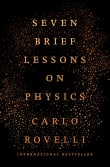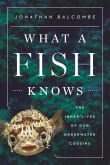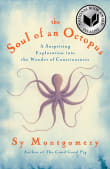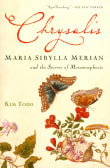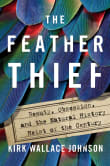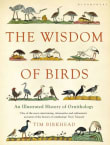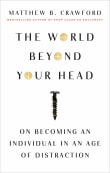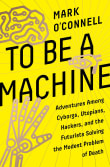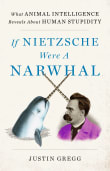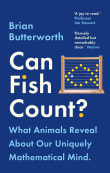Other Minds
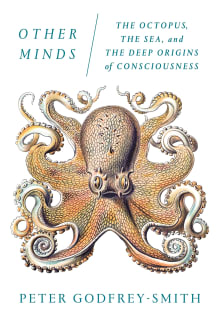
Book description
'Brilliant' Guardian 'Fascinating and often delightful' The Times
SHORTLISTED FOR THE 2017 ROYAL SOCIETY SCIENCE BOOK PRIZE
What if intelligent life on Earth evolved not once, but twice? The octopus is the closest we will come to meeting an intelligent alien. What can we learn from the encounter?
In Other…
Why read it?
8 authors picked Other Minds as one of their favorite books. Why do they recommend it?

The mystery of consciousness and the fascinating world of octopuses—two of my favorite topics—come together in this book. In the opening chapter, the author, a philosopher and scuba diver, declares, “Octopuses are the closest we will come to meeting an intelligent alien.”
The book delves into how octopuses evolved independently from vertebrates, leading to features like their decentralized nervous system—each arm functions as if it has its own brain alongside a central brain. This unique “design” makes octopuses an ideal subject for exploring the concept of consciousness.
The book often raises more questions than it answers—it occasionally left me feeling…
From Isabelle's list on stop eating octopus salad.

I love the way the book takes you on a personal journey—full of close-up, underwater encounters with octopuses and cuttlefish—that led Godfrey-Smith to a profound revelation: evolution has created minds not just once but over and over again.
When we think about “animal minds,” we often think about cats, dogs, chimpanzees, and dolphins… but these are all mammals—only one tiny twig on the tree of life. Minds are everywhere, including in invertebrate animals that are very different from us.
From Jonathan's list on change the way you think about animal minds.

This is an amazing nonfiction book about how octopuses have evolved in parallel with humans but along a very different evolutionary path. I’m so interested in the idea of ‘otherness.’ The notion is that there could be alien life forms that are hugely intelligent. Still, their bodies and their perceptual organs are so different that we can’t fully communicate with them and appreciate that intelligence.
The most fascinating aliens are right here on Earth, in the oceans, and can teach us profound lessons about consciousness. Octopus arms can sense and perceive independently, like multiple brains. Octopuses can’t perceive color but…
From Abi's list on speculative fiction with soul.
If you love Other Minds...

Cephalopods, which encompass creatures like squids, cuttlefish, and octopuses, stand as some of nature's most peculiar inhabitants.
Without bones or outer shells, they possess the remarkable ability to alter their shape, almost resembling characters from Gary Larson's extraterrestrial sketches. What sets them apart further is their exceptional intelligence, a trait not commonly associated with their mollusk cousins like snails and oysters.
Godfrey-Smith puts forth a compelling argument suggesting that intelligent life may have independently evolved multiple times right here on our home planet. He contemplates whether consciousness, once believed to be a solely human attribute, emerged early in the animal…
From Lars' list on animal intelligence – from aliens to octopuses.

As a philosopher, scientist, and scuba diver, Peter Godfrey Smith uses the remarkable biology of the octopus to make us think about how other organisms experience the world. Godfrey-Smith is such a capable and powerful writer, the book is almost worth buying just for his recap of how complex life on Earth evolved in the introduction.
Octopuses have such a different kind of nervous system to ours that their limbs can sense and act independently from the central brain, and may even be able to ‘think’ for themselves. By studying such a radically different and surprisingly intelligent life form, Godfrey…
From Tom's list on science about way more than science.

When we think about brainpower, we (even scientists!) usually think of ourselves, other terrestrial or marine mammals like elephants, chimps, dolphins, and whales, and perhaps a few birds like magpies and crows.
Not too many believe that cephalopods (which include cuttlefish, octopuses, and squids) can be smart in their own way! In this book, the author crafts a very persuasive case for intelligence outside our own species, including alien-looking species such as octopuses.
I enjoy that Peter Godfrey-Smith draws on both, the latest and most accurate scientific research and his adventures as an avid scuba diver to make his case…
From Maddalena's list on what animals feel and think.
If you love Peter Godfrey-Smith...

I love the way this accessible book presents evolutionary theory of mind through an exploration of cephalopod intelligence. If we wish to explore alien intelligence, it helps to recognize the varieties of intelligent life right here on earth. Godfrey-Smith’s telling is intriguing, intelligent, heartwarming, and touching. At such a critical time on our planet, how can we better understand and care for our fellow earthlings? And, What does this teach us about ourselves?
From Linda's list on meaningful engagement with objects and people.

Cephalopods are about as close to alien life as you’ll find on planet Earth. Godfrey-Smith, a professor of philosophy and the history and philosophy of science, explores the natural history of octopuses and their close relatives in this book. It’s a fascinating look at our evolving understanding of their unique evolutionary path and implications for our own ideas of consciousness. If you’ve seen the documentary film My Octopus Teacher and want to learn more about the inner workings of our eight-legged friends and their kin, I highly recommend this book.
From Melissa's list on natural history.
If you love Other Minds...
Want books like Other Minds?
Our community of 12,000+ authors has personally recommended 100 books like Other Minds.




